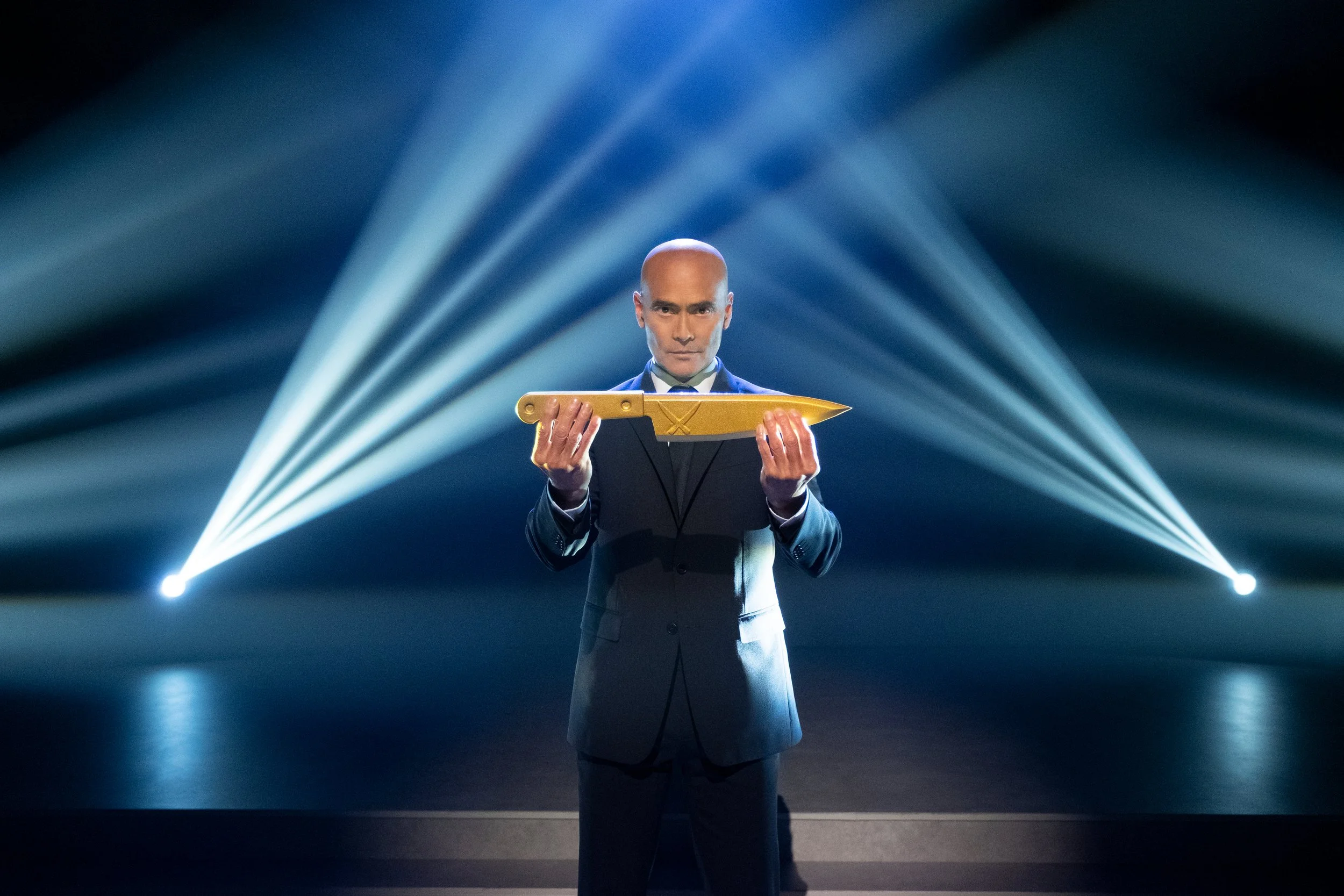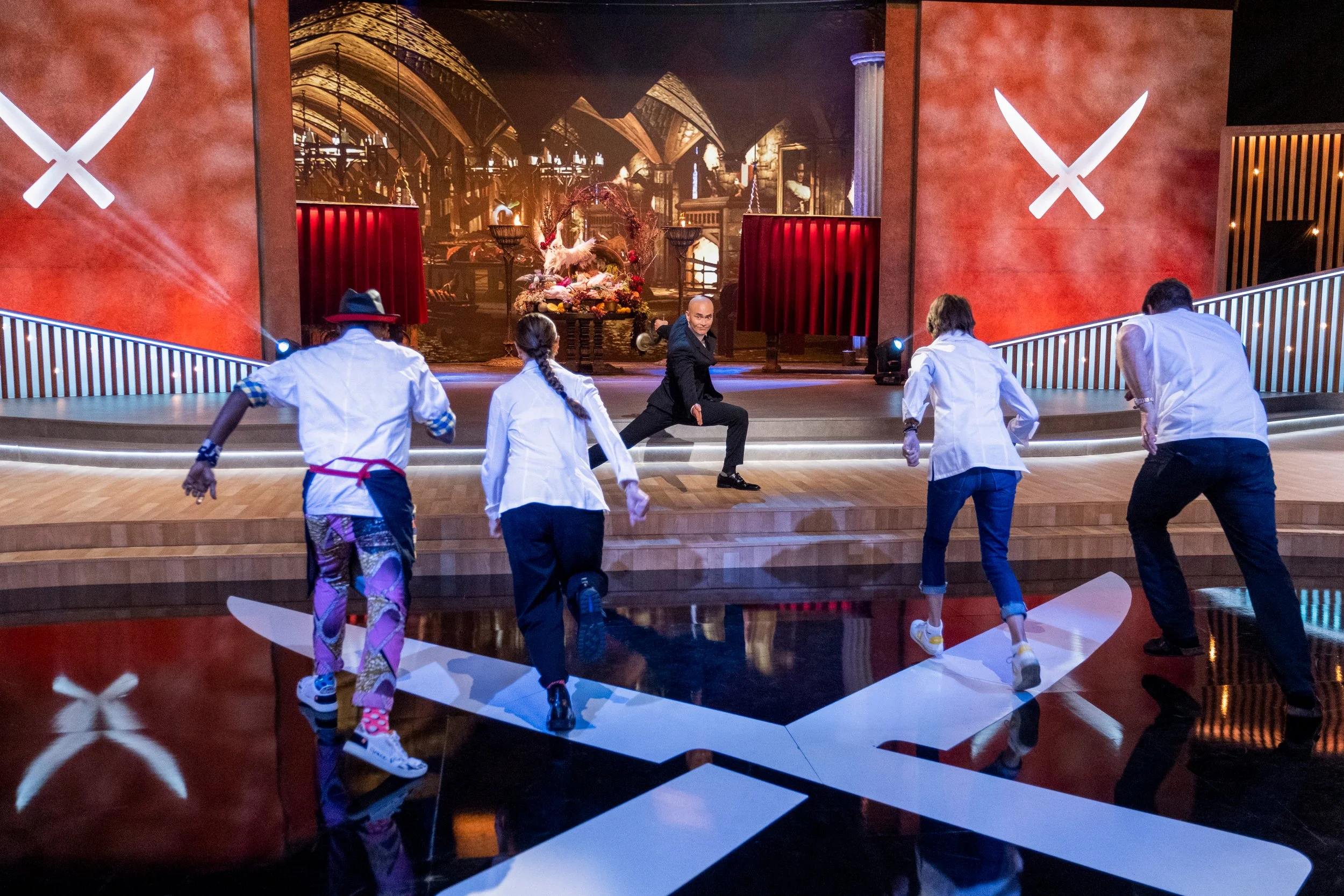Mark Dacascos Can’t Cook, But He Can Kick A** in the Reboot of Iron Chef
Mixed Asian Media - July 1, 2022
By Melissa Slaughter
Iron Chef: Quest for an Iron Legend. Photo Credit: Adam Rose/Netflix
If you grew up in the early 2000s, you probably watched at least one episode of Iron Chef America, the Food Network’s first competition show. And if you’re like me, you probably watched the show regularly, religiously even. Watching Iron Chef was a family pastime. My brother, my mom, and I would gather around and watch chefs like Masuhara Morimoto, Bobby Flay, or Michael Symon cook up ingredients like sockeye salmon, eggplant, or kobe beef — spinning them into works of culinary art. Food Network’s heyday had a part in developing my relationship with food and cooking. And it was one of the few times I saw an Asian person on screen.
Mark Dasascos played the Chairman on Iron Chef. Every episode he would introduce the secret ingredient by yelling, “Allez cuisine” and karate chopping the air, signaling the start of the battle. For years, I naively thought he was actually related to the original Chairman from Iron Chef Japan, Takeshi Kaga. Years later, I found out Mark was not only an actor, but an incredibly skilled martial artist and, of course, that he’s mixed Asian.
Before joining the Food Network, Mark had made a career in films like Brotherhood of the Wolf, Crying Freeman, and Cradle 2 The Grave. But nowadays, you might know him better as Zero, the John Wick-fanboy assassin in John Wick: Chapter 3 - Parabellum.
Mark joined me via Zoom to discuss the new Iron Chef, his love of martial arts films, and his 23andMe results.
Interview
Iron Chef: Quest for an Iron Legend. Photo Credit: Patrick Wymore/Netflix
You have a very multicultural, very multiracial background. How has that influenced you and your work?
Well, I guess the advantage is that it's enabled me to play a lot of different characters. The disadvantage, I suppose, is that sometimes I'm not enough of anything to play what they're looking for. So it really depends on the project and what the producers and director are looking for. The other advantage is that I did my 23andMe and found out I'm even more mixed.
Really? What did you find?
So on my birth certificate, it says Japanese, Chinese, Filipino, and Irish. Then we went into the 23andMe, and it broke it down. The Irish also has German, French, and English. And a small percentage of Scandinavian. Hello! I'm an Asian Viking. Then for the Asian parts: Filipino, Austronesian (everywhere from Australia to Polynesia), Southeast Asian, Japanese, Okinawan, some Chinese, Thai. Then it was Malaysian or Indonesian. The pie chart is so colorful!
You're the definition of AAPI. You're Asian, you're American and Pacific Islander. You're all of it!
Yes. Oh, and I said Korean?
No, you didn't.
Yes. And I love Korean food. I'm so proud.
You're truly like a buffet of all the things.
Yes, a buffet. I like that!
I was listening to an interview you did about your life and your work, and I heard that you wanted to initially be a monk, like in the Jet Li movie The Shaolin Temple?
Yes, yes, yes. That is true. And like any monk, I married a Texas girl and had three kids and became an actor. What is it? I'm a little, you know, mixed up. Mixed Asian? Mixed up Asian!
Iron Chef: Quest for an Iron Legend. Photo Credit: Adam Rose/Netflix
Well, I was curious, what kind of movies and entertainment did you watch growing up?
From 12 until 18, I was in Hamburg, Germany, with a six month stay in Taipei, Taiwan when I was 17. So it gets very confusing. In my teenage years, my training partner and my friend I've known the longest, Emmanuel Betancourt — he's from West Africa. Imagine a 6’2” West African built like a tank. And then there's this quasi mixed Asian guy speaking German in Hamburg — almost every week we would watch a Jackie Chan, Jet Li, or a Bruce Lee movie at the theaters. In addition, on Sundays, they'd play foreign films and American films and all that. So I love foreign films, and I grew up with martial arts movies. When I saw Jet Li in The Shaolin Temple, I was blown away. I thought, “This guy and this life looks amazing.” You know, you're practicing martial arts and philosophy, and you're living a simple and good life. I just thought, “I got to do that.” So at 17, I saved up some money — my father went with me, he helped me get set up in Taipei — and for six months, I did the best I could to learn Chinese and study with a great kung fu teacher over there, in hopes of someday joining a temple. And then things happened.
And then you switched to being an actor?
Yes!
I'm going to do a hard pivot to Iron Chef. So you grew up watching Jet Li. I grew up watching you on Iron Chef. You were one of the very few Asian faces I saw, and now the show is reaching a whole new generation. So for anyone who hasn't seen that show, can you describe it?
Absolutely. Well, in essence, it is a cooking competition with a very long, deep, profound DNA history. The original show started in Japan, and then came to America. We did the American iteration, and now we are going global. And if I could be so grandiose, [you can think of it like] King Arthur and his knights. It's like the Chairman with his Iron Chefs and the Iron Chefs’ battle against challenging chefs. And then we get Alton Brown and Kristen Kish going at it for those 60 minutes, commentating and talking about it, getting in the thick of the cooking. It's very dynamic. Now we've gone deeper and bigger in terms of the culture and history and food because we didn't have to stop for the commercials breaks. So Alton and Kristen can do their thing and really interact with the chefs.
Can you tell me how you got involved in the original version and how you came back into the new version?
My introduction to Iron Chef Japan was walking through the living room of our house one day, and my wife had the television on. I saw a slow-mo of a tomato being sliced, and I thought that was really cool. So, my wife introduced me to Iron Chef Japan. A few months later we got a call, and I was told by my representatives that the producers were now doing an American version of Iron Chef, and they wanted to have a meeting with me. My wife, being a huge fan of Iron Chef, said, “You're going to take that meeting.”
So I took the meeting, and they asked me some questions. I did disclose that I do not cook, but I can kick. And they said, “No problem, we don't need you to cook. We just need you to be basically the nephew of Chairman Kaga.” And I thought, “Oh, that could be interesting.” And I gave them some ideas about how I could see the character, how the Chairman could possibly play with his dialogue and so forth. And apparently they liked the ideas.
Iron Chef: Quest for an Iron Legend. Photo Credit: Adam Rose/Netflix
We had an amazing run on the Food Network, and we finished. Then my representatives got the call from our producers for this show, and I was ecstatic, emotional — because I've been a part of the show since the beginning, and I'm close with Alton and our other cast members. I was honored to be invited back and also very nervous because how do we build on what we had done? You know, satisfy our original audience and then, in the end, do something for the new audience? I haven't seen any of the battles yet, so I don't know if we've achieved that. I'm keeping my fingers crossed. I just know that shooting it, it felt like our new iteration had an excellent spirit, a positive big spirit. And because it is Netflix, you know, we had the resources to go bigger, bolder, broader, deeper.
Very excited to see it. So I feel like, as mixed Asian people, we have very strong relationships with food and food culture. So I'm curious, what is your favorite food? And also, what is one of your favorite dishes you've had on Iron Chef?
Oh my gosh, that's brutal. We've had 238 or 240 something battles! What stands out really is — and I cannot remember which fish it was — Iron Chef Morimoto did five of the most amazing fish dishes I'd ever seen or tasted in my life. I remember he did make a sushi roll, and it looked like stained glass. And right now in my life, I'm really into Thai, Korean, or Vietnamese food.
Your 23andMe food!
There you go!
End of Interview
Iron Chef: Quest for an Iron Legend. Photo Credit: Patrick Wymore/Netflix
Melissa Slaughter has lived in all four time zones in the continental United States. She is a podcast producer based in Brooklyn, NY.
You can hear her work on her independent podcast We're Not All Ninjas (with co-host Alex Chester), as well as on shows from Pineapple Street Studios, Netflix, and HBO.






